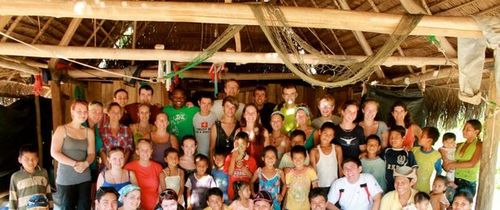Researching in the Amazon
Last Summer, Joshua Marcovici and Munashe Chinyanganya, second-year Biomedical Science students, embarked on the internship of a lifetime. Operation Wallacea, a network of academics that carry out scientific excursions all over the world, brought the project to the attention of first-year Biomedical Science students.
Josh and Munashe then spent two weeks in Peru, carrying out biodiversity surveys on an amazing variety of endangered species. I spoke to them about their time with Operation Wallacea and what their project involved.
So how did you first hear about the opportunity to do research abroad and get involved in the project?
Munashe: An Operation Wallacea representative spoke to us in a lecture at the start of the year. He told us about all the exotic locations that we could visit and that it was a really great way for life science students to get experience.
Josh: We found out that it was also possible to go with friends or as a group, so we decided to go together. It was really easy to get involved too. You just had to contact and ask.
M: Yeah, it was £360 for the two weeks in Peru and you can basically go whenever you want. You have to get a few injections before you go as well.
What sorts of things did you do during the project?
J: The majority of the work involved carrying out biodiversity surveys. We measured the snouts of Cayman crocodiles, did population counts of pink dolphins and we counted the number of species in certain areas.
M: A lot of the work that Operation Wallacea does is to see the effects that climate change and deforestation have on the biodiversity of the rainforest.
What was your favourite part?
J: My favourite part was measuring the snouts of the crocodiles – they were really cool animals to work with. Also, knowing that the work you’re doing is going towards something really worthwhile is great.
M: Yeah, I think the Cayman crocodiles were my favourite animals as well, but the pink dolphins were awesome too. Being stuck on a barge for two weeks doesn’t sound great, but we formed really good friendships with the other people on board.
J: Because it’s an international project as well, you get to meet people from all over the world. Spending time with the locals in Peru was really great as well.
M: Yeah, I loved the time we spent in Equatos. The guides were really good as well and they came out with us on the last night.
J: We went to bars and outdoor clubs in Equatos, it was a really great celebration at the end.
Were there any mishaps during or problems during the trip?
M: Yeah, Josh had a bit of a problem!
J: I was actually bitten by a bat at one point! Luckily I’d had my rabies shot before I went.
So did the wildlife cause a few issues for you then?
M: Well when you’re on a barge in the Amazon, you kind of expect it, but the spiders were the worst thing.
J: I had arachnophobia before I went, but I don’t mind them now. You just get used to them.
M: Someone found a centipede in their sardines one day – all the food was really fresh and made by the locals, so stuff like that just happened sometimes!
Any downsides to the trip?
J: At first, there was quite a lot of waiting around, since obviously you can’t always count on the target species being there.
M: I’d definitely suggest bringing a pack of cards! But having that downtime made it really easy to make friends, and that was one of the best things about the trip.
Did it help you to make any decisions about what to do after graduation?
M: Yeah, I don’t think either of us want to go into biodiversity, but it was a great opportunity to try it first-hand.
J: A lot of people on the trip did want to follow careers in biodiversity. It was definitely something I’d do again, but probably not as a career.
Would you recommend the project to other people?
J: Definitely. It’s a really brilliant experience working first-hand with such rare species.
M: It was a great project, though I would say that you should do a bit of research before you go.
J: There are different surveys depending on the time of year and the location you go to, so if there’s something specific you want to do, make sure that the project that you’re taking part in will be offering it.
M: Overall though, we both had a really fantastic time. It’s something we’ll probably never do again, and it’s a great experience to have had.
Operation Wallacea runs excursions in nine different locations, ranging from two to eight weeks. Excursions for undergraduate research assistants take place all year round. More information can be found on their website at www.opwall.com

Comments (1)